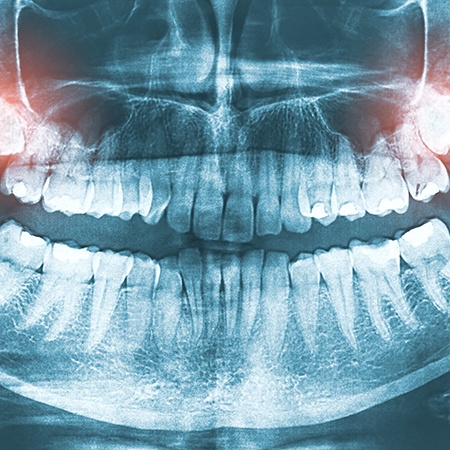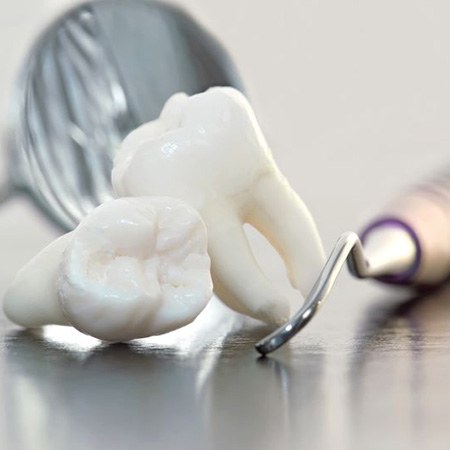Wisdom Tooth Extractions – Louisville, KY
Safe and Effective Third Molar Removal

Dr. Cordini has seen all kinds of wisdom teeth complications, and he will always take the time to fully understand your unique situation before planning an extraction to relieve your pain and protect the rest of your teeth. If there’s someone in your family who might have to deal with impacted wisdom teeth in the near future, call us today to learn more about wisdom tooth extractions at our Louisville, KY periodontal office. You can also read on to learn more about this procedure!
Why Choose Cordini Periodontics & Implants for Wisdom Tooth Extractions?
- Relaxing IV Sedation Offered
- Gentle, Encouraging Chairside Manner
- We Take Our Time with Each Patient
What are Wisdom Teeth?

Wisdom teeth removal is so common that it’s often thought of as a rite of passage for teenagers and young adults, but what exactly are these teeth and why do we have them? In short, they are your third set of molars, and they’ve earned the nickname “wisdom teeth” because they usually emerge between the ages of 17 and 25. While they served an important role for our ancestors, they usually create problems for patients today, which is why having them extracted is so common.
Why Do Wisdom Teeth Need to Be Removed?

Certain people are able to keep their wisdom teeth, but that’s only in circumstances where they’re able to erupt normally and can easily be cared for. In most cases, wisdom teeth will need to be removed due to becoming fully or partially trapped under the gums, causing constant oral pain and raising the risk of infection. It is generally best to have potentially problematic wisdom teeth removed before they start causing serious problems or permanent damage.
What to Expect from the Wisdom Teeth Procedure

Of course, the process of removing wisdom teeth looks a bit different from patient to patient. For example, some patients want sedation dentistry added to their treatment plan while others are happy with us simply numbing their mouth. Furthermore, some patients have wisdom teeth that have broken through the gumline while others have ones that are impacted below the surface. Whatever the case may be for you, you can trust that Dr. Cordini, along with the rest of our Louisville dental team, will do everything we can to make the process of removing your tooth as comfortable, positive, and pain-free as possible.
Recovering from Wisdom Teeth Extraction

When you return home, you’ll need to focus on recovering. After all, having your wisdom teeth removed is an extensive procedure! Here are a few general guidelines we give our patients:
- Don’t exercise, smoke, spit, or drink through a straw
- Use a cold compress for 10 minutes at a time to ease inflammation
- Take prescribed or OTC pain medication as directed
- Wait to eat until the numbing agent has worn off
- Eat only soft foods, like plain yogurt and applesauce
- Keep your mouth clean to prevent an infection
- Drink plenty of water to stay hydrated
Understanding the Cost of Wisdom Tooth Extractions

The cost of wisdom tooth extractions varies from case to case; it depends on several factors. During your consultation with our team, we can share some specific numbers and help you understand your payment options. We do not want you to be unduly stressed about the financial aspect of your care, so we can file insurance claims for you and help you apply for a low-interest payment plan.
Factors That Can Impact the Cost of Wisdom Tooth Extractions

The cost of your wisdom tooth procedure can be influenced by several factors, including:
- The number of wisdom teeth that need to be removed. Not everyone develops four wisdom teeth. Plus, some people choose to only have their most troublesome wisdom teeth removed while leaving the others in place.
- Whether or not the teeth are impacted. Impacted teeth are stuck fully or partially beneath the gumline. Whether or not your wisdom teeth are impacted, as well as the level of impaction, can affect the details of your procedure and have a bearing on its overall cost. Soft tissue impaction (where a tooth is stuck in the gums) is generally less costly to deal with than bony impaction (where a tooth is completely stuck in the jawbone).
- Our practice offers three different types of dental sedation, all of which come at different price points. Some patients choose not to be sedated; their procedure is performed under local anesthesia instead.
Does Dental Insurance Cover Wisdom Tooth Extractions?

Many dental insurance plans do cover wisdom tooth extractions. Usually, this procedure is classified as a major service, meaning that up to 50% of its cost may be covered (up to the amount of your plan’s annual maximum). Our team welcomes insurance, and we will be happy to help you figure out how your policy applies. We can also file claims on your behalf and communicate with your insurer to make sure you get the benefits you are entitled to.
Other Options for Making Wisdom Tooth Extractions Affordable

Outside of dental insurance, there is another option that might make it easier for you to afford wisdom tooth extractions: financing. We work with both CareCredit and Proceed Finance to help our patients get approved for low-interest payment plans. Most people are eligible for a monthly payment amount that fits their budget!
Wisdom Teeth Extractions FAQs

Dr. Cordini and our team are ready to help you say goodbye to troublesome wisdom teeth. Before you schedule your surgical consultation, however, you may want to know more about your third molars and what you can expect from wisdom tooth extractions in Louisville. To help you out, we have compiled a list of answers to some commonly asked questions. If you do not see the specific information that you were searching for, give us a call — we look forward to speaking with you!
Does Everyone Have Wisdom Teeth?
Most people develop four wisdom teeth. However, a 2015 article from the Dental Research Journal estimated that 5 – 37% of people are missing one or more of their wisdom teeth. Keep in mind that even if you cannot see your wisdom teeth, they may be present, but they could be hidden beneath the gumline. An X-ray is the best way to tell if you have them. Also, it is worth noting that while most people develop them in their teens or early 20s, some people develop them earlier or later in life.
How Should I Prepare for My Wisdom Tooth Extraction?
One of the most important things you can do to prepare is talk to the doctor who will perform the extractions. Dr. Cordini will be happy to answer your questions and address any concerns you might have. Our team wants you to be able to commit to the procedure with confidence! Other things you can do include:
- Arrange for someone to drive you to and from our office.
- Do not smoke for at least 12 hours prior to your appointment.
- Wear comfortable clothing. (If you are getting IV sedation, it should be easy to roll up your sleeves.)
- Stock up on soft foods to eat after your procedure. Things like applesauce, ice cream, smoothies, and yogurt are good choices.
What’s the Best Age to Get Wisdom Teeth Removed?
There are no hard-and-fast rules about when wisdom teeth should be removed. However, the procedure generally happens in young adulthood because it is easier to extract the teeth before they are completely developed and strongly embedded in the jaw. Younger people also tend to have an easier time recovering from the procedure. If your dentist recommends wisdom tooth removal for you, it is best to get it done sooner rather than later so you can avoid future problems.
Should Wisdom Teeth Be Removed If They Don’t Hurt?
It is true that not everyone needs to have their wisdom teeth removed. However, many people choose to do so as a purely precautionary measure. If you are considering undergoing the procedure, our team can let you know about both the risks and potential benefits of moving forward.
If your dentist in Louisville recommends wisdom tooth removal, it is best to comply with their advice. Even if the teeth do not hurt at the moment, it is possible that they will cause serious problems in the future. For example, they might push nearby teeth out of place and increase your risk of infections and cysts.
Why Do We Have Wisdom Teeth?
There’s no way to know for sure why humans have wisdom teeth, but it’s believed that they were much more useful for our ancestors than they are for us. Early humans at a much rougher diet than we do, often including raw meat or uncooked vegetables. Having an extra set of molars could have allowed them to process their diet more easily.
Some also speculate that tooth loss was more common for early humans than it is for us. It may have been common for their molars to fall out before early adulthood; the coming of wisdom teeth would therefore be an opportunity to replace them.
How Do You Make Wisdom Teeth Pain Go Away?
If your wisdom tooth hurts, the only permanent cure is usually to remove it. However, if you’re still waiting for the day of your procedure, there are a few things that you can do to make yourself a bit more comfortable in the meantime:
- Wrap an ice pack in a towel and place it against your cheek for around 20 minutes at a time
- Take care not to irritate the area around your wisdom tooth
- Take over-the-counter pain medicine as directed
- Make use of over-the-counter oral numbing gel
- Rinse your mouth with saltwater to clean the area and bring down some swelling
Is Wisdom Tooth Removal Painful?
As with any even remotely invasive procedure, we’ll take the time to numb your mouth completely before beginning your wisdom tooth extraction. This means that the most you’ll feel during the procedure is a slight pressure as the molar is removed; an odd feeling, but not necessarily an unpleasant one.
Of course, you might be fairly sore in the days after your procedure. However, this can be managed easily with a combination of proper aftercare and any pain medication we prescribe you. Within a week you should feel back to normal again!
How Soon Can I Eat After Wisdom Teeth Removal?
After your tooth has been removed, it’s generally a good idea to wait an hour or two before you eat anything. The gauze will need to remain in place and be switched out as necessary, which precludes eating immediately after your treatment. Your mouth will also still be numb for a few hours, and eating in this condition means that you could accidentally bite your cheek or tongue without realizing it.
Many patients fast before their procedure, particularly if they’re going to be under the influence of sedation during the procedure. That means that you might be hungry immediately after your treatment, but do your best to follow the instructions we give you regarding eating after your procedure. And when you do eat, you may want to stick to a soft food diet in order to protect your teeth.


